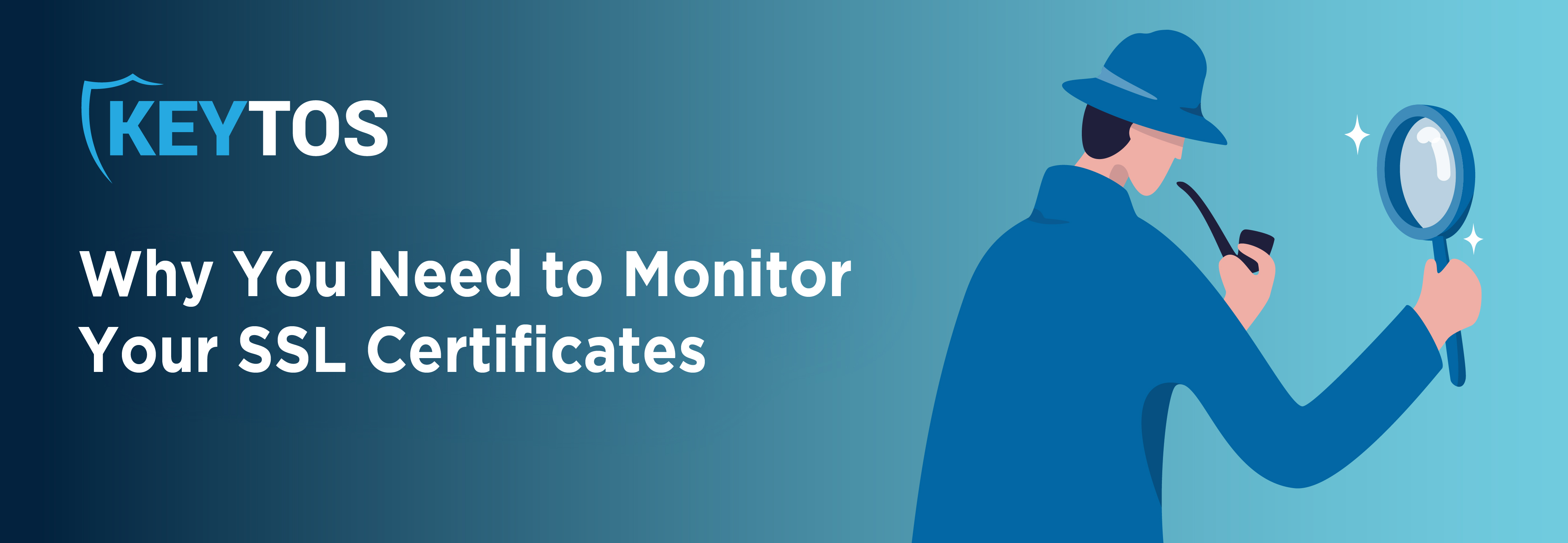
What is SSL Monitoring? Why is SSL Monitoring Important?
What is SSL Monitoring/SSL Certificate Monitoring?
SSL monitoring, also referred to as SSL certificate monitoring, is the ongoing process of checking and validating SSL certificates and their configurations on websites and services. SSL monitoring involves validation of certificate expiry, configuration checks, vulnerability detection, and chain validation. SSL monitoring is crucial for modern cybersecurity and Public Key Infrastructure (PKI) because it ensures the integrity and security of data transmission. By constantly overseeing SSL traffic, organizations can detect and prevent security breaches, such as man-in-the-middle attacks and unauthorized data access.
Validation of Certificate Expiry
An expired certificate can result in warnings being shown to users, or worse, the website becoming inaccessible. This simple issue has caused an outage in 80% of organizations in the past two years, causing millions of dollars’ worth of lost revenue and wasted engineering time. Monitoring ensures that certificates are renewed on time, eliminating any potential downtime.
These certificate renewals are missed for a variety of reasons: from a certificate that was renewed but not installed in all endpoints where it is used, to human error of forgetting to renew the certificate or just an abandoned calendar invite due to the employee in charge of the renewal leaving the company. While fully automating your certificate lifecycle is crucial for running a world class SSL configuration, having an SSL monitor that can find all your certificates and alert you if a renewal is about to be missed can save you thousands of dollars.
Configuration Checks
Configuration checks ultimately boil down to three main areas: cipher strength verification, protocol review and server settings.
Cipher strength verification is vital because SSL/TLS relies on ciphers for encryption. SSL monitoring tools ensure that your server uses strong ciphers, reducing the risk of man-in-the-middle attacks and other vulnerabilities.
With reference to protocol review, over time, some older SSL/TLS protocols become obsolete and can be exploited. Monitoring checks for the use of these outdated protocols, recommending more secure, updated versions.
Apart from ciphers and protocols, a variety of server settings such as HTTPS redirects, HSTS headers, and cross-origin resource sharing can impact SSL/TLS security. Monitoring ensures settings are optimized for the best security posture.
Vulnerability Detection
Keeping up with the latest SSL vulnerabilities and misconfigurations can be a full-time job! Changes to the SSL ecosystem quietly happen (such as Google’s upcoming 90-day certificate rotation requirement or KB5014754 for private certificates), and if you are not paying attention or are not alerted on these changes, you can be affected by an SSL related outage. Modern SSL monitoring solutions will not only alert you, but also give you step-by-step mitigation instructions to help you solve the issue.
Certificate Chain Validation
It is an absolute necessity to verify the certificate chain from end to end. The certificate chain refers to the hierarchical structure of certificates, starting from your website’s certificate and tracing back to the root certificate. Any break in this chain can result in validation failures. During our time monitoring private networks, we have seen many companies with thousands of invalid certificates either issued by a shadow IT Certificate Authority, or self-signed certificates created by people in the organization. Ensuring that all certificates are issued by a trusted PKI with adequate protection and audit trail is paramount for the security of your organization.
Monitor Certificate Transparency Logs
While having visibility into the certificates you issue and you know about is great, there is still the problem of certificates that you don’t know about or were not issued by your organization. To find these certificates, you must scan the Certificate Transparency Logs. Using one of Google’s recommended certificate transparency log monitors can help you get visibility into all your certificates detecting attacks before they happen. EZMonitor, our SSL monitoring tool, even has some extra security alerts, such as when similar domains are created (these can be used for phishing), dangling DNS alerts, and CAA mismatch alerts, because even if you have a CAA, if an attacker hacks a public certificate authority, they can still issue a certificate for your domain.
Why is SSL Certificate Monitoring Important?
So, this is all well and good, but what specifically is the reason why SSL monitoring is important? We’re glad you asked! With a proper SSL monitoring tool, you can prevent downtime, maintain trust, remain compliant, avoid vulnerabilities, and enhance your organization’s reputation. Let’s learn a little more about each.
SSL Certificate Monitoring Helps Prevent Downtime
Expired SSL certificates can cause website outages or display security warnings to users. SSL monitoring ensures you’re always ahead of certificate expiry dates.
SSL Certificate Monitoring Helps Maintain Trust
An invalid or expired SSL certificate can alarm visitors with browser warnings, potentially causing them to leave your site. Maintaining a valid certificate assures users that your site is safe and trustworthy.
SSL Certificate Monitoring Helps Your Organization Remain Compliant
For many industries, ensuring encrypted data transmission is not just a best practice — it’s a requirement. Regular SSL monitoring helps in staying compliant with industry regulations.
SSL Certificate Monitoring Helps Avoid Vulnerabilities
Cyber threats evolve constantly. By actively monitoring SSL configurations and patches, businesses can protect against known vulnerabilities and weaknesses.
Enhance Your Organization’s Reputation
In the dog-eat-dog world of business, reputation is often the most important way to start and maintain a relationship. A secure and well-maintained online presence boosts your company’s reputation. It assures partners, customers, and stakeholders of your commitment to security.
Is SSL Monitoring Secure?
You might be wondering if the process of monitoring itself can introduce vulnerabilities. Rest assured, when done properly with the right tool, SSL monitoring is a secure practice that greatly improves your organization’s overall security posture. To put your mind further at ease, though, here are three facts about SSL monitoring that highlight its security:
Most SSL monitoring tools perform non-intrusive, read-only checks on the SSL certificates. This means that they don’t alter any settings or data during the monitoring process.
Reputable SSL monitoring solutions use encrypted databases and secure methods to store any collected data, guaranteeing that it doesn’t fall into the wrong hands.
Finally, by continuously monitoring SSL certificates, businesses can identify and rectify issues proactively, before they become vulnerabilities.
How to Choose the Best SSL Certificate Management Tool for Your Organization
When considering an SSL monitoring tool for your organization, it is vital that you take into consideration your specific use case and the preferences that accompany it – no solution is one-size-fits-all, after all. Some other key factors to emphasize and investigate before committing to an SSL monitoring tool are the support and expertise the provider, well, provides, as well as the solution’s price and overall value added to your organization. For a comprehensive overview, check out our blog outlining the best SSL monitoring tools for organizations to consider.


